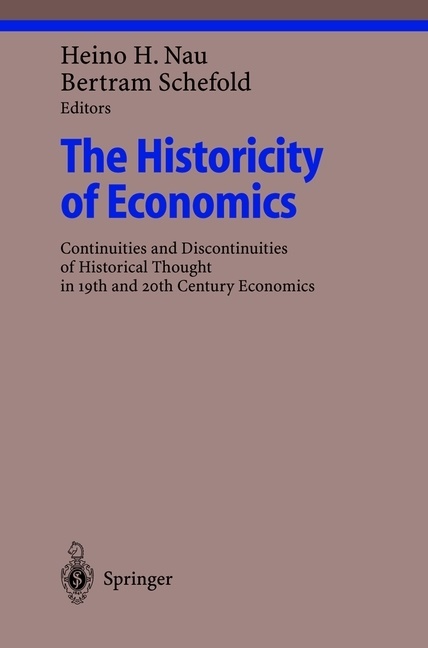Ulteriori informazioni
In this volume, continuities and discontinuities between Historical School of Economics and Old Institutional Economics are examined with regard to common research objectives and methods. Similarly, those between these two economic movements and New Institutional Economics as well as new economic sociology are discussed. The following questions functioned as a guideline for the contributing economists, sociologists, historians, and philosophers: Can we meaningfully speak of the Historical School of Economics (HSE) as an economic research program? What are the commonalities between the HSE and American old economic institutionalism? Does the HSE represent a part of the "lost anteroom" of New Institutional Economics and new economic sociology? How and why should the HSE matter to how we do economic and social theory today?
Sommario
History Matters: From Historical Economics to Modern Institutionalism.- 1 The German Historical School of Economics: What It Was Not, and What It Was.- Commentary.- Commentary.- 2 Grand Historical Narrative or Intellectual Strategy: The Institutional Establishment of the Historical School of Political Economy in the 19th Century.- Commentary.- Commentary.- 3 Institutional Economics and the Problem of Historical Specificity.- Commentary.- Commentary.- 4 Economics as Ethical Economy and Cultural Economics in the Historical School.- Commentary.- 5 What Can New Economic Sociology Learn From the Historical School, especially Max Weber?.- Commentary.- Commentary.- 6 The Role of Culture in Economic Theorizing and Empirical Economic Research.- Commentary.- List of Authors and Discussants.- Index of Names.
Info autore
Prof. Bertram Schefold ist Inhaber des Lehrstuhls für Wirtschaftswissenschaften an der Johann-Wolfgang-Goethe-Universität, Frankfurt. Mehrfach Berater des Deutschen Bundestages zu energiepolitischen Fragen und geschäftsführender Herausgeber der Reihe 'Klassiker der Nationalökonomie'.
Riassunto
In this volume, continuities and discontinuities between Historical School of Economics and Old Institutional Economics are examined with regard to common research objectives and methods. Similarly, those between these two economic movements and New Institutional Economics as well as new economic sociology are discussed. The following questions functioned as a guideline for the contributing economists, sociologists, historians, and philosophers: Can we meaningfully speak of the Historical School of Economics (HSE) as an economic research program? What are the commonalities between the HSE and American old economic institutionalism? Does the HSE represent a part of the "lost anteroom" of New Institutional Economics and new economic sociology? How and why should the HSE matter to how we do economic and social theory today?
Testo aggiuntivo
From the reviews:
"It is an attempt to penetrate the concepts of classical economic positions and their origins, as well as – starting from the historical specificity – developing suggestions for a renovation of economic methodology in historical terms. Furthermore, the method of disputation of the collected volume follows a scholastic manner … . This quaestio disputata, the exchange of views, is what makes this volume particularly interesting." (Nils Goldschmidt, Jahrbucher für Nationalökonomie und Statistik, Vol. 224 (4), 2004)
"At the heart of the book is … German Historical School of Economics (GHSE) whose epistemology is discussed along with its role in contemporary economic debate. … the book highlights the fact that during the last fifty years the economic debate has freed the GHSE from the view that considered it a conscious support for a conservative, authoritarian state … . This is an interesting and stimulating book." (Frank C. Dwight, The Journal of European Economic History, Vol. 31 (2), 2002)
Relazione
From the reviews:
"It is an attempt to penetrate the concepts of classical economic positions and their origins, as well as - starting from the historical specificity - developing suggestions for a renovation of economic methodology in historical terms. Furthermore, the method of disputation of the collected volume follows a scholastic manner ... . This quaestio disputata, the exchange of views, is what makes this volume particularly interesting." (Nils Goldschmidt, Jahrbucher für Nationalökonomie und Statistik, Vol. 224 (4), 2004)
"At the heart of the book is ... German Historical School of Economics (GHSE) whose epistemology is discussed along with its role in contemporary economic debate. ... the book highlights the fact that during the last fifty years the economic debate has freed the GHSE from the view that considered it a conscious support for a conservative, authoritarian state ... . This is an interesting and stimulating book." (Frank C. Dwight, The Journal of European Economic History, Vol. 31 (2), 2002)

